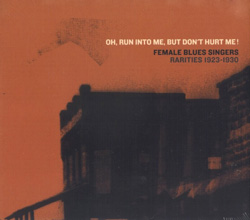
Those marginal personalities, those stuck in the cracks, who needed to fail so the continuity of history, of what really happened, could assert itself, are here shown the spotlight. Sub Rosa conjures the specter of those ironic female blues singers too uncompromising for vaudevilles and medicine shows during the Great Depression.
"What circumstances led to their exclusion?", the label wonders. More pertinent still seems the question, why bother now to go fishing in their graves? Perhaps only to gut them again? To prove there was a history before our epoch so as to assuage some rampant uncertainty? A litany of reasons arise like moths to a light-bulb; all share a certain equiprobability, so all such speculation comes to seem inconsequential. What remains are these coarse, cadaverous voices, half-eaten by static, standing there denuded, like a string of bodies without qualities.
What no doubt offended sensibilities at the time was that the overall feel of the sounds took precedence over coherence or even consistency. The high-tension babbling and gut-level meanderings thus cock a snook at the mainstream folk and blues values of the time, against its creative ossification into commoditized formulae and listless emotions.
So, yes, there is an unmistakable whiff of vigor to these bar-stool piano melodies and wah-wah guitar lines, which start off bluesy before threatening to get out of control. Sub Rosa also does a fine job of providing information and telling background stories about each artist. Beyond that, though, the music's intrinsic simplicity is pushed to the point of redundancy. A strange documentary, then - as though a sort of mirror, as much light as one tries to shine on it, it only reflects it all back onto contemporary culture, and the panoply of roles music holds within it.
Comments and Feedback:
|



